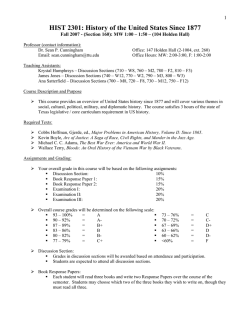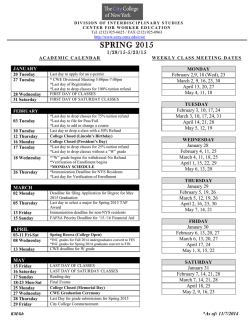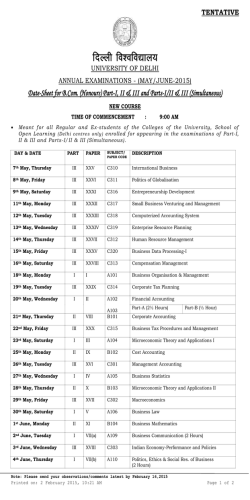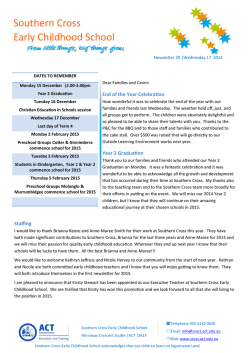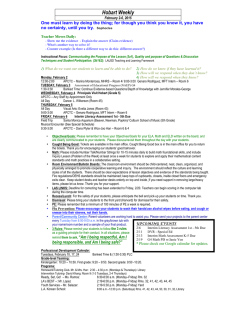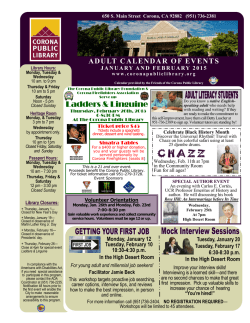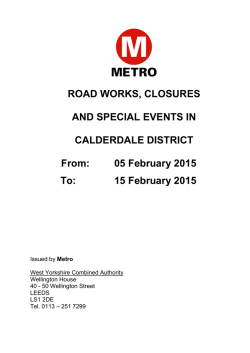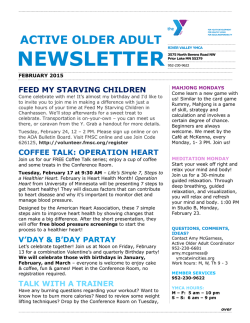
Syllabus - Cornell University Department of History
1 ENVIRONMENTAL HISTORY: THE U.S. AND THE WORLD History 2581 (Also American Studies 2581 and BSOC 2581), Spring 2015. MW, 9:05-9:55, McGraw 165; plus sections (required) W at 1:25 (White 110), 2:30 (White 104), or 3:35 (McGraw 365). DRAFT SYLLABUS: NOT YET FINALIZED NOTE: SECTIONS BEGIN ONE WEEK FROM THE START OF CLASSES; THE FIRST SECTIONS WILL BE ON WEDNESDAY, JANUARY 28. AND: THE FIRST READINGS FOR THIS COURSE ARE IN THE XEROX PACKET, AVAILABLE AT THE UPS STORE IN COLLEGETOWN, AT 407 COLLEGE AVE. PLEASE GO TO THE STORE AS SOON AS YOU CAN, ESPECIALLY SINCE THEY MIGHT RUN OUT OF PACKETS, IN WHICH CASE THERE WILL BE A 24-HOUR WAIT WHILE THEY PRINT NEW ONES. Whenever we will be discussing a reading from the packet, please bring it to class. Professor Aaron Sachs ([email protected]) Phone: (w) 607-255-1978 Office Hours: McGraw 350, Tues. 2:00-4:00, and by appointment. TA: Molly Reed. This lecture course serves as an introduction to the historical study of humanity’s interrelationship with the natural world. Though we will be very careful not to judge the people of the past according to 21st-century ecological standards, we will certainly spend a lot of time drawing connections between past events and present-day environmental concerns. Is there a link, for instance, between the Dust Bowl of the 1930s and the current trend toward global warming? Our focus will be on the United States, but we will also explore the geopolitical context of American environmental history. This is an interdisciplinary course, incorporating approaches not only from history but also from ecology, public policy, law, economics, geography, anthropology, literary studies, philosophy, and art history. There are no prerequisites. Environmental history is a relatively new and rapidly evolving field, taking on more importance as the environment itself becomes increasingly important in world affairs (perhaps especially in the last decade, since Hurricane Katrina). During this semester, we’ll examine the sometimes unexpected ways that “natural” forces have helped shape human history (the role of germs, for instance, in the colonization of North America); the ways human beings have shaped the natural world (through agriculture, urbanization, and industrialization, as well as the formation of things like wildlife preserves); and the ways cultural, scientific, political, and philosophical attitudes toward the environment have changed over time. We’ll also do our best to analyze the complex interrelationship of thought and action in an environmental context: have shifting cultural currents changed the ways we have treated the natural world, and have anthropogenic changes in the natural world changed the way we think? And how is it that 2 America’s national identity is so wrapped up in both the exploitation of nature and the protection of nature? Requirements: All readings listed on the syllabus; Active participation in section discussions; Attendance at all lectures; All papers listed on the syllabus. Please contact your section leader immediately (in advance, whenever possible) about any section you have to miss. You can make up the work from a missed section by turning in a two-page response paper to the appropriate readings within one week of your absence. These should be analytical essays and NOT simple summaries. You cannot make up a missed lecture, but you are responsible for the material covered in it, so please ask a classmate for notes (you are also welcome to come talk to me about what you missed). Paper assignments will incorporate material from both lectures and readings. PLEASE NOTE: I have a no-electronic-devices policy in the classroom. Grading: This is a reading- and writing-intensive course. They key to its success is your active engagement and participation, and your grades will be assigned accordingly. Overall participation will determine 25% of your final grade. Paper #1 is worth 10% of your final grade. Papers #2 and #3 are worth 15% each. The final paper is worth 35%. The outline for your final paper will be ungraded, but you will receive comments on it, and it will factor into the grade for your final paper. Please understand: regardless of these percentages, it is impossible to pass this course without turning in all the required assignments. In other words, it is not acceptable to skip a paper and simply take a “zero” on it. Out of fairness to everyone in the class, you must complete all the papers (even if they’re late), or you will receive a failing grade for the semester. Also, any case of plagiarism will automatically receive a failing grade and may result in a failing grade for the entire semester. The requirements explained further: Papers: Each will have its own assignment sheet and will be discussed in class. In fairness to the class as a whole, please don’t request extensions except under extreme circumstances. Late papers will be marked down by half a grade for every day they’re late. Paper #1: 4 pages. The Place and Time Project, Part 1. Paper #2: 5 pages. Mid-term paper on class readings. Paper #3: 5 pages. The Place and Time Project, Part 2. Final Paper (10 pp.): The topic for this paper should be generated from the class readings, but you may also do some outside reading and research. Make a conscious effort to grapple with the central themes of the course. I will provide a list of suggestions, but it will ultimately be up to you to decide on an appropriate topic. You’ll have a meeting with your section leader to discuss possible topics during the week of April 20th, and you’ll be asked to turn in an outline (ungraded) on Monday, April 27th. A few paper guidelines (to be supplemented later in the semester): -- The most common academic problem at Cornell is plagiarism. Please make sure that you are well informed on this issue. Use citations whenever necessary; follow an established citation format; and be consistent in the format you choose. Always leave yourself plenty of time to complete assignments. And don’t rely heavily on the internet. Wikipedia is generally not an 3 acceptable resource for the purposes of this class. If you ever have any questions about citations, talk to me or a librarian, or visit the library’s webpage and check out the link to “citation management,” which will also give you the university’s full academic integrity policy. --Always number your pages. --On the first page, include your name, the name of your section leader, the name and number of the course, the name and number of the assignment, the date, and the title of your paper. Use a title that actually means something. --Always double-space your papers and leave at least one-inch margins. --Make sure your paper is not too long or too short. --PROOFREAD. Leave yourself plenty of time to read and revise your work. Even better, trade papers with a classmate and get his/her comments and corrections. DO NOT RELY SOLELY ON A COMPUTER’S SPELLING/GRAMMAR CHECK. Your paper grades WILL be affected by stylistic problems such as spelling and grammar errors. --I prefer two-sided printing/copying, if possible. WEEKLY TOPICS AND ASSIGNMENTS: Note: Readings are listed under the sessions when they will be discussed—but you’ll want to start them several days in advance. Week One. Wednesday, January 21. Introductions and Assumptions. Week Two. Monday, January 26. Deep History and Ecological Imperialism. Wednesday, January 28. Native Perspectives. SECTION. --J.R. McNeill, excerpts from Something New Under the Sun: An Environmental History of the Twentieth-Century World (PACKET) --Ramachandra Guha, excerpt from Environmentalism: A Global History (PACKET). --Rebecca Solnit, excerpts from Hope in the Dark: Untold Histories, Wild Possibilities (PACKET) Week Three. Monday, February 2. Capitalism and Colonialism. --Happy Woodchuck Day! Wednesday, February 4. Forests. SECTION. --William Cronon, Changes in the Land (entire—but skip Foreword and Afterword) Week Four. Monday, February 9. Agriculture on the Eve of Industrialization. --Assignment for Paper #1 handed out in class. 4 Wednesday, February 11. Romanticism and American Landscapes, 1825-75. SECTION. Henry David Thoreau, Walden, Ch.1-7 (pp. 1-157) (up to and including “The Bean-Field”) Week Five. Monday, February 16. NO CLASS: FEBRUARY BREAK. ENJOY!! Wednesday, February 18. DISCUSSION OF THE SECOND HALF OF WALDEN. Please come prepared for the lecture slot as if you were coming to section. SECTION. No section today, since we’re having our discussion in the lecture slot. Week Six. Monday, February 23. Indians, National Parks, Preservation, and Conservation. --PAPER #1 DUE IN CLASS ON MONDAY, FEBRUARY 23. Wednesday, February 25. Slavery, Emancipation, and Plantation Agriculture. SECTION. --John Muir, excerpts from Our National Parks (PACKET) --Gifford Pinchot, excerpt from The Fight for Conservation (PACKET) ADDITIONAL REQUIRED LECTURE: THURSDAY, FEBRUARY 26, AT 7PM, IN MCGRAW 165. JENNIFER PRICE, “STOP SAVING THE PLANET!” Week Seven. Monday, March 2. Animals and Their Habitat --Assignment for Paper #2 handed out in class. Wednesday, March 4. DISCUSSION DURING LECTURE! PLEASE PREPARE THE FOLLOWING: Jennifer Price, Flight Maps, Ch. 1-2. SECTION. No section today, since we’re having our discussion in the lecture slot. Week Eight. Monday, March 9. Cities and Industrial Growth at the Turn of the Century. Wednesday, March 11. Conservation and Preservation, 1916-1956. SECTION. --Liberty Hyde Bailey, The Holy Earth (entire) Week Nine. Monday, March 16. The Dust Bowl. —PAPER #2 (MID-TERM PAPER) DUE IN CLASS ON MONDAY, MARCH 16. 5 Wednesday, March 18. Water in the West. SECTION. --Arthur Rothstein, The Photographs of Arthur Rothstein (entire; select two images to focus on) Week Ten. Monday, March 23. Ecological Ethics. --Assignment for paper #3 handed out in class. Wednesday, March 25. DISCUSSION DURING LECTURE! PLEASE PREPARE THE FOLLOWING: Aldo Leopold, A Sand County Almanac: please read all of part 1 (“A Sand County Almanac,” pp. 3-98); in part 2 (“The Quality of Landscape”), please read “Wisconsin,” “Illinois and Iowa,” and “Arizona and New Mexico” (pp. 101-45); you can skip part 3; and please read all of part 4 (“The Upshot,” which includes “The Land Ethic,” “Wilderness,” and “Conservation Esthetic”), pp. 237-95. I’d recommend reading the entire volume, but I’ve cut about 100 pages just to make the assignment more manageable. In short, the required reading is pp. 3-145 and pp. 237-95. SECTION. No section today, since we’re having our discussion in the lecture slot. Week Eleven. NO CLASS ON Monday, March 30, and Wednesday, April 1: SPRING BREAK. ENJOY!! Week Twelve. Monday, April 6. Suburbanization, Cars, and Consumer Culture. Wednesday, April 8. Silent Spring. SECTION. -- Price, Flight Maps, Ch. 3. --Rachel Carson, excerpts from Silent Spring (PACKET). Week Thirteen. Monday, April 13. Earth Day. --PAPER #3 DUE IN CLASS ON MONDAY, APRIL 13. Wednesday, April 15. Environmentalism and Environmental Justice. --Final Paper assignment handed out in class. SECTION. --Nancy Langston, Toxic Bodies (entire). Week Fourteen. Monday, April 20. The Next Industrial Revolution. 6 Wednesday, April 22. WALKING FIELD TRIP IN CELEBRATION OF EARTH DAY. SECTION. CONFERENCES. Please be ready to discuss your final paper topics. Week Fifteen. Monday, April 27. International and Global Perspectives. --OUTLINES (UNGRADED) FOR FINAL PAPERS DUE ON MONDAY, APRIL 27, IN CLASS! Wednesday, April 29. Energy in Historical Perspective. SECTION. -- Philippe Squarzoni, Climate Changed (entire). Week Sixteen. Monday, May 4. The Environment Today: You and Your Consumption. Wednesday, May 6. Wrap-up. SECTION. --Paul Sabin, The Bet (entire). FINAL PAPERS ARE DUE BY THURSDAY, MAY 14, AT 4PM! PURCHASING BOOKS I've ordered all of the books NOT at the Cornell Store but rather at Ithaca's only independent (and cooperatively owned) bookstore, Buffalo Street Books. Store details: Hours: Mon–Sat 10-8, Sun 10-5. Address: DeWitt Mall, 215 N. Cayuga (in downtown Ithaca) The books are already in stock at the store, and you are welcome to shop there whenever you'd like. But also please note that you can have the books delivered to you at the third meeting of this class, next Wednesday, January 28th, at 9:05am, in McGraw Hall 165. To have the books delivered in class, all you have to do is go to the store’s website and place your order. There is no delivery charge, and NO TAX. Here’s the appropriate link: http://www.buffalostreetbooks.com/#!students/cuiy It’s fine to pursue used copies, but please try to get the right edition of each book, since we'll be referring to the text fairly frequently in class, and I’d like everyone to have the same pagination if possible. These books will also be available on the Cornell library system as "networked resources" or on 2-hour reserve at Uris Library; for the most part, I was able to put the correct edition on reserve, though in some cases it was not available. Please bring the actual book to class when we are scheduled to discuss it. If you read a book on reserve, then please bring precise notes with you to class. 7 The complete list of books for the course, with prices, is below. Again, the course number is History 2581, and you can order any or all of these titles for delivery. --William Cronon, Changes in the Land (Hill and Wang, 2003), $15 --Henry David Thoreau, Walden (Beacon Press, 2004)—intro by Bill McKibben, $10.95 --Jennifer Price, Flight Maps: Adventures with Nature in Modern America (Basic, 2000), $17 --Liberty Hyde Bailey, The Holy Earth (Dover, 2009), $8.95 --Arthur Rothstein, The Photographs of Arthur Rothstein (GILES, 2011), $12.95 --Aldo Leopold, A Sand County Almanac; with Essays on Conservation from Round River (Ballantine, 1970), $7.99 --Nancy Langston, Toxic Bodies: Hormone Disrupters and the Legacy of DES (Yale, 2010), $22 --Philippe Squarzoni, Climate Changed: A Personal Journey through the Science (Abrams ComicArts, 2014), $24.95 --Paul Sabin, The Bet: Paul Ehrlich, Julian Simon, and Our Gamble over the Earth’s Future (Yale, 2014), $18
© Copyright 2026
